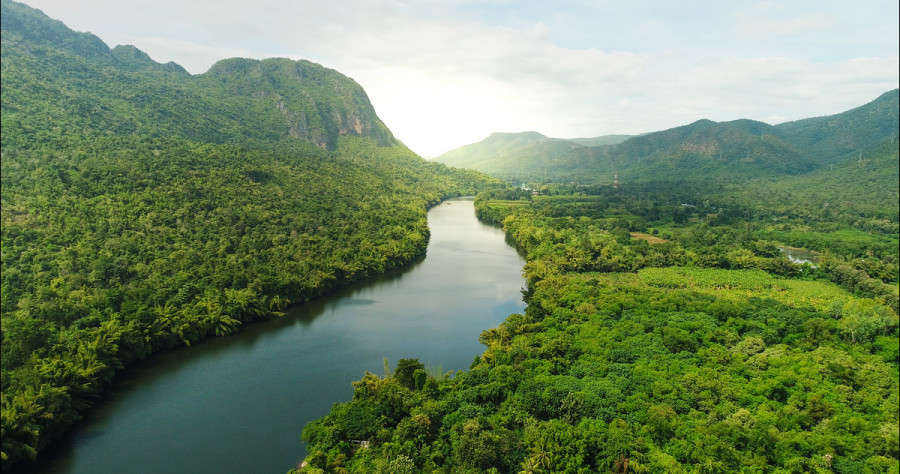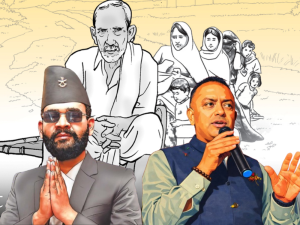Columns
Sailing through rough waters
We have no option but to tackle our problems independently with limited external support.
Madhukar Upadhya
The onset of Trump 2.0 has rattled the global order and threatened to upend the democratic ideals and values born from the Second World War. For over half a century, the US and much of the international community were committed to reshaping institutions and formulating policies to ensure the well-being of diverse populations—now under threat from the current administration’s actions. Already, ripples of growing uncertainty are visible across almost every field in the global south that relied on American goodwill and aid from fighting poverty, improving health services, ensuring access to education and promoting agriculture to addressing hunger and famine.
Consequently, with Trump’s continued belligerence towards climate action, evident by his withdrawal from the Paris Climate Accords once again and the reversal of US domestic climate policies of clean energy and the Green New Deal in favour of increasing fossil fuel production, we cannot even begin to understand the vast and far-reaching implications of current US foreign policy and its immediate and long-term impacts worldwide. Given these circumstances, when the hubris of climate professionals who relied on global assistance has all but fizzled out, we must redouble our efforts to prepare for the worst-case scenario.
Bioregioning
As the dominos resulting from the US’s decisions begin falling in the coming weeks and months, the compounding, intersecting challenges, particularly the climate crisis, will continue. This nebulous moment presents us with the opportunity to reorient our approach to problem-solving, centring on self-reliance to the extent possible when managing our forthcoming crises. One such approach is bioregioning, which is gaining traction among climate and environment professionals, exploring how we can overcome the complexities of transitioning to a climate-friendly planet.
A bioregion is a geographic area defined not by political or economic boundaries but by its natural features—geology, topography, climate, watersheds, agriculture and biodiversity. It is a way of reframing our natural environment management by restoring vital ecological systems. It acknowledges that we live within watersheds shaped by natural spaces rather than the areas designated by administrative boundaries. In that sense, this emerging idea of bioregioning brings the concept of managing these environments within watersheds—which, unfortunately, have never received the importance they deserve in Nepal despite their introduction some four decades ago—into the focus of our development plans.
In a bioregion, development takes on a new meaning, measured against the regeneration of the health and carrying capacity of the land and the improvements in community resilience. It helps repair the fractures created by climate impacts and ecological overshoots through the re-localisation of the economy. Bioregioning helps us recondition ourselves to think about managing the environment within a natural boundary if we want to keep on top of our climate problems. The importance of bioregioning, or simply managing watersheds, lies in the fact that they have a key role to play in regulating rainwater—a vital component impacted by climate change—connecting all users like agriculture, settlements, industries, grasslands, biodiversity and vegetation within its boundary through springs, rivers, lakes and other water bodies.
Hence, the quality of the natural spaces within a bioregion depends upon how well the rainwater is regulated, and any aberration by anthropogenic or natural reasons results in the degradation of soil, water and/or vegetation, reducing the quality of the overall environment. Taking water as an entry point to regenerate degraded resources is, thus, critical considering how climate change alters rainfall distribution. Besides, the winter months are becoming increasingly drier, with little to no snow on the high mountains to augment river flows during the spring season.
Cultural connection
Although a relatively novel term, bioregioning is even corroborated by our culture and traditional practices. A closer look shows how our traditions and practices are rooted in relationality with nature. Across Nepali communities, practices of revering land, water, or forests exist. The Magar people, for example, worship the earth as a deity by offering prayers to appease nature and ensure overall prosperity in their farming lives. The Kirat people believe in worshipping the earth, trees and rivers. Tharus revere water as a part of their traditional religion. Magh, the Nepali month in midwinter, is dedicated to appreciating nature by taking holy dips in ponds and rivers. Be it periodic events like the Kumbh Mela or the annual bathing ritual for a month in the rivers while fasting for the goddess Shree Swasthani, demonstrating a deep respect for water is at the core of such rituals.
These customs of worshipping water, land and forest, in addition to their communal and religious origins, were traditional ways of coaching people to take responsibility for the stewardship of these natural spaces and resources, which are vital for human survival. However, the pursuit of satisfying our insatiable hunger for economic gain benefitting a few at the cost of many, including the local ecology and infrastructural development with no regard for the limitations of our local context, has amplified climate impacts. This has led to accelerated degradation by impoverishing the soil and biodiversity and depleting water sources.
We are increasingly witnessing several results, such as drying springs and rivulets across the country and the loss of land to floods and rampant erosion, including landslides. City people, especially, are far removed from understanding how the once fertile soil, such as in Kathmandu Valley, has deteriorated over the years. The emerging scenario provides an opportunity to take responsibility for restoring ecological systems by promoting bioregioning that helps reconnect people to living systems and each other in much the way our traditions did.
Ramping up climate-relevant actions
With climate momentum being forced to slow down, it’s becoming increasingly apparent that we will have no option but to try and tackle our problems independently with limited external support, no matter how hard we may try to convince the globe. Some groundwork seems to have been laid in place already. For the past 12 years, the government has been marking at least 5 percent of its annual public budget as highly relevant to climate action. Transitioning from an aid-dependent Western interpretation of development, we must begin incorporating bioregioning in executing our climate-relevant actions with our decades-old experiences in managing watersheds nationwide. This two-pronged approach will surely help us sail through the rough waters ahead.




 26.22°C Kathmandu
26.22°C Kathmandu



.jpg&w=200&height=120)











